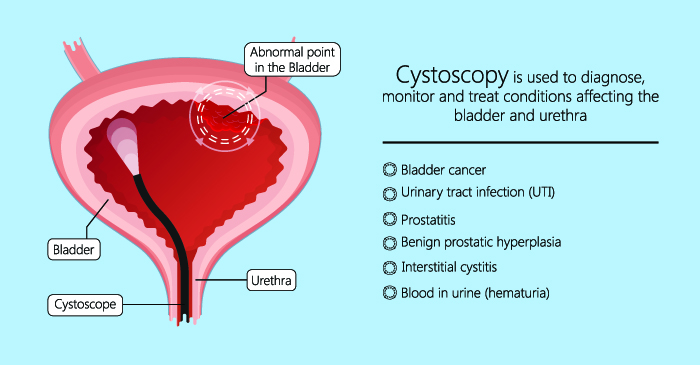Cystoscopy Surgery in Chirag Enclave, Delhi
Overview of cystoscopy treatment
A cystoscope is an instrument with a camera to view and manage certain conditions related to the inside of your urethra(urine tube) and bladder. Therefore cystoscopy is both an investigation as well as a treatment procedure performed by the best urinary tract specialists in Delhi.

About cystoscopy treatment
A cystoscopy is a daycare procedure. It helps to diagnose the following conditions:
- Urinary tract infections
- Urinary bladder or urethral cancer
- Bladder stones
- Enlarged prostate gland (Benign Prostate Hyperplasia)
- Bladder control issues incontinence.
- Urinary fistulas
Preparing for the procedure
- Your urine sample will be examined one day before to assess for any signs of infection that need to be controlled before the procedure.
- You will be instructed to stop any blood-thinning medicines.
- You will be advised by your urologist to empty your bladder fully just before a cystoscopy is done.
- An anesthesiologist may instruct you to stop taking food and water several hours before the procedure.
During the procedure
- A local or general anesthesia will be injected to make the procedure completely painless.
- The cystoscope with a camera or viewing lens is inserted inside your urethra connected to a viewing monitor.
- Saline is then pushed in through the scope to distend your bladder. This allows your urologist to easily view the inner lining of your bladder.
- Once the problem or diagnosis is confirmed, another set of surgical instruments may be passed through. The damaged portion is repaired or removed depending upon your condition.
Post-surgery care
- The entire process usually lasts not more than 15-20 minutes.
- You will be kept under observation for any signs of infection in the form of fever, bleeding, or pain.
- After discharge, monitor yourself for any signs of infection mentioned above.
Who qualifies for cystoscopy?
You may qualify for a cystoscopy if you have -
- Urinary retention problems or incontinence.
- Difficulty in holding back urine or urine spillage.
- Blood in your urine is also known as hematuria.
- Urinary tract infections.
- Presence of stones in your bladder.
- Pain during urination.
You must consult a urologist near you to help you diagnose and treat the cause of your symptoms through cystoscopy.
Request an appointment at Apollo Spectra Hospitals, Chirag Enclave, Delhi.
Call 1860 500 2244 to book an appointment.
Why is cystoscopy performed?
- Injecting a dye inside your urethra allows it to be viewed on an X-ray film.
- To remove urinary stones, polyps, tumors.
- Urine samples may be acquired from your urethra for further laboratory examination.
- Biopsy: A small quantity of your tissue is taken out to study it for cancerous growth or any other hidden infections.
- To place a stent in your urethra in case of a pyeloplasty.
- Certain medications may be injected into your bladder or urethra to control urinary problems.
Different Types
- Rigid: The cystoscope is rigid through which other surgical instruments can be passed. Usually done to take a tissue sample or biopsy.
- Flexible: A flexible cystoscope allows your urologist to view the inner lining of your bladder and urethra.
Benefits of cystoscopy
- Quick and reliable diagnosis of your urinary problems.
- Your recovery time is shortened.
- Fewer treatable complications.
Risks or Complications related to cystoscopy
- You may develop urinary tract infections post a cystoscopy.
- You may notice blood in your urine for a couple of days that usually subsides by itself.
- There may be pain during urination for 24-48 hours which can be controlled with pain-relieving medications.
- The urethra may develop scar tissue. Painful spasms may occur in your bladder muscles.
If you have been given local or general anesthesia, it is advisable to get yourself a safe ride home as the anesthesia may cause you to feel dizzy.
A cystoscopy usually causes bladder muscle spasms for a couple of days but subsides by itself or may require medication.
Reporting is generally done within a few hours for all procedures within a cystoscopy but a biopsy will take 2 weeks as your tissue is cultured in the lab.
Yes, you may be able to continue with your daily activities as soon as you are deemed fit by your urologist. You may resume your house and office work as well as have sex.
Sometimes. A catheter may be left in place to drain out fluid or urine for a few hours.
Symptoms
Our Top Specialities
NOTICE BOARD
CONTACT US
CONTACT US
 Book Appointment
Book Appointment


.svg)
.svg)
.svg)
.svg)








